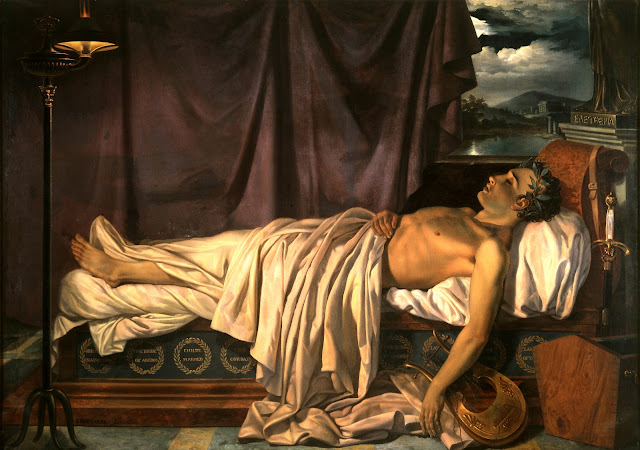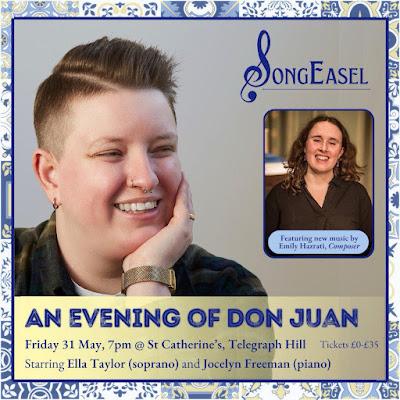 |
| Lord Byron on His Deathbed, by Joseph Denis Odevaere (c. 1826). |
An Evening of Don Juan: Emily Hazrati along with songs by Schubert, Elise Schmezer, Liszt, Tchaikovsky, Wolf, Ravel, Quilter, Walton, Maconchy, Barber, Britten, James MacMillan; Ella Taylor, Jocelyn Freeman; SongEasel at St Catherine’s Church
Reviewed 31 May 2024
Song in South East London, an imaginative programme taking us through Byron’s Don Juan in an eclectic but vivid programme bookended by two new songs from Emily Hazrati
Pianist Jocelyn Freeman’s concert series, SongEasel has as it subtitle, ‘Bringing Song to South East London’ and their current concert series A Vast Obscurity is celebrating music and poetry in a wide variety of SE London venues. We caught up with them at St Catherine’s Church, Telegraph Hill on Friday 31 May 2024 when soprano Ella Taylor and Jocelyn Freeman presented An Evening of Don Juan, celebrating the bicentenary of Lord Byron’s death with a song programme themed around Byron’s famous satirical poem, Don Juan. The evening featured the premiere of two new songs by composer Emily Hazrati along with songs by Schubert, Elise Schmezer, Liszt, Tchaikovsky, Wolf, Ravel, Quilter, Walton, Maconchy, Barber, Britten and James MacMillan.
Byron wrote his satirical poem Don Juan between 1819 and 1824, completing 16 of 17 cantos; an epic poem written in ottava rima, Byron’s Don Juan portrays the Spanish folk legend of Don Juan, not as a womaniser as historically portrayed, but as a victim easily seduced by women. Apart from Hazrati’s two new songs, which bookended the programme, none of the songs reference Byron or Don Juan directly, instead the imaginative programme led us through Don Juan’s adventures, being seduced as a schoolboy by a woman who is sent to a nunnery as punishment, being shipwrecked on a Greek island, Juan apparently forgetting the women he leaves behind, being taken up by a Sultan’s wife, getting mixed up in the Imperial Russian Army, visiting London and so on.
The result was an eclectic yet satisfying programme full of vitality and variety, it also played to one of soprano Ella Taylor’s strengths as it was clear from the beginning that they enjoy telling a story. Each song was projected with character, yet you never felt that they were pushing the music towards opera, this remained a song recital full of stories.
We began with Emily Hazrati’s The Schoolboy setting a text by Joseph Spence. Hazrati featured as one of the composers on Young Composers 5, the latest iteration of the National Youth Choir’s Young Composers scheme on disc [see my review]. Spence is local, he is Master of Dulwich College and wrote the libretto for Emily Howard’s opera The Yellow Wallpaper [see my review]. Spence, in fact, wrote a complete cycle of poems (also in Ottava Rima) inspired by Byron’s Don Juan, taking the hero through the seven ages of man. Hazrati chose to set two poems, The Schoolboy and the final poem, Sans everything (or Don Juan reflects) but the hope is that they will be able to create a complete song-cycle.
The performance of The Schoolboy revealed one of the limitations of St Catherine’s Church, despite Ella Taylor working hard the words did not always come over well in the resonant acoustic. Hazrati’s music combined a vivid and jagged piano part that hinted at a regular rhythm but did not quite settle, with chatteringly rhythmic vocal line, delivered with relish by Taylor, particularly the dead-pan ending.
The programme had four of Samuel Barber’s Hermit Songs spread through it, beginning with ‘At Saint Patrick’s Purgatory’. Both performers invested a lot in the song, and it seemed to fit Taylor’s voice well, with their combination of lyricism and strength. Schubert’s Nähe des Geliebten (Close to the beloved) was contained and concentrated, with a sense of stillness, then Barber’s ‘Church Bell at Night’ from Hermit Songs transformed the atmosphere into something rather eerie, yet Taylor delivered the trenchant ending ‘light and foolish woman’ with relish.
It was interesting hearing Taylor and Freeman in Ravel’s Cinq mélodies populaires grecques having heard the songs recently sung by James Newby at Leeds Lieder [see my review]. Taylor brought out the lightness of texture, vivid but not as intense perhaps more sympathetic. ‘Chanson de la mariée’ was joyous and ardent, ‘Là-bas, vers l’église’ rather haunting, ‘Quel galant m’est comparable’ vividly character with Taylor embodying the galant, and in ‘Chanson des cueilleuses de lentisques’ they spun the exotic melody in a way that was haunting. We ended with the pure joy of ‘Tout gai!’
Wolf’s Die verlassene Mägdlein (The forsaken girl) hinted at the many women Don Juan left. Here, Taylor and Freeman created a quiet, concentrated atmosphere, bringing out the song’s lyrical bleakness. Elise Schmezer was a name that was new to me. Born to a musician father in Graz (now in Austria), on marriage she moved to Braunschweig where she published songs in the late 1840s and early 1850s, though not a lot is know about her. Die Sultanin (The Sultaness) was perfectly apt for Don Juan’s involvement with a Sultan’s wife. Here, the music was lyrically ardent, full of romantic foreboding, the romantic outpouring for Taylor supported by Freeman’s dramatic piano. Something of a discovery. Hugo Wolf’s Der Tambour (The drummer boy) turned us to Don Juan’s military exploits in Russia, and here Taylor told the story with relish, embodying the drummer boy imagining his mother as a witch. This group ended with a bleaker reflection of war, James MacMillan’s ‘The Children’ from Three Scottish Songs; this sets William Soutar’s poem originally written about the terrible deaths of children in the Spanish civil war. MacMillan’s setting is remarkable and bleak, the voice left largely unsupported with the piano providing flashes of terrible gestures. Both Taylor and Freeman created something remarkable out of it, a haunting bleakness and terrible beauty.
Heinrich Heine’s Du bist wie eine Blume was presented not in one of the better known settings but in the 1843 song by Franz Liszt, simple yet effective with an intriguing cast to the melody. The song reflected Don Juan’s difficulties with the cold in Russia, which led to his visit to England. First, Walton’s ‘The Lord Mayor’s Table’ from A Song for the Lord Mayor’s Table, with Taylor clearly enjoying the music’s combination of bravura flourishes and lyricism This was one of those performances that made you long to hear the whole work. Still in England, we heard Elizabeth Maconchy’s ‘King Stephen’ from Four Shakespeare Songs from 1965. Maconchy’s songs are a long way from English pastoral, and here we had strong words, vivid character and a vibrant performance. This contrasted remarkably with Roger Quilter’s Now Sleeps the Crimson Petal where Taylor and Freeman invested in the song, taking its heart on sleeve approach seriously. Another of Barber’s Hermit Songs followed, the tiny but perfect ‘Promiscuity’, a terrific aphorism given real character. Finally in this group we reflected on Don Juan’s tendency to walk away from his women, with Britten’s Johnny from the cabaret songs written with W.H. Auden. Here Taylor began with enjoyable character and then gradually let rip with something more operatic.
Maconchy’s ‘Take, O take those lips away’ from her Four Shakespeare Songs revealed quite how far she was from Quilter. This was a terrific song, haunting, mysterious and complex. Tchaikovsky’s To Forge So Soon (sung in the original Russian) moved from lyric intensity to powerful drama, terrific stuff. Then the final Barber Hermit Song, ‘The Desire for Hermitage’, really capturing the song’s distinctive atmosphere.
We ended with the second of the two Hazrati/Spence songs, Sans everything (or Don Juan reflects) where Spence’s poem has Don Juan reflecting on Byron’s unfinished final canto, leaving Don Juan’s fate in the air. The song began with Taylor almost intoning the text against a wonderful wash of piano chords, then as the song became more dramatic, Taylor moved from song to speech, ending with striking melodrama and then vocalise as they walked off stage, the ending unfinished and up to us the audience to decide.
After the concert there was a short Q&A with Freeman, Hazrati and Spence (though Taylor was in the audience and good-naturedly added their comments occasionally), talking more about their collaboration on the songs and Spence read the whole of his nine-poem sequence, tempting us with ideas of a future complete cycle.
Freeman’s SongEasel clearly has a lot of local support and it was heartening to see that some of the distinguished patrons listed in the programme were actually present in the audience. A Vast Obscurity continues next month with a free fringe concert in Walworth and a free lunchtime concert, Shakespeare in Song in Dulwich, and ends with tenor Mark Padmore and Jocelyn Freeman in The Wanderer and The Soldier in Dulwich.
Never miss out on future posts by following us
The blog is free, but I’d be delighted if you were to show your appreciation by buying me a coffee.
Elsewhere on this blog
- Back to the 1960s: Opera Holland Park returns to its 2008 production of Tosca and creates a satisfying evening in the theatre – opera review
- Telling a story: Solomon’s Knot in stylishly vivid form for the Canon’s version of Handel’s Esther – concert review
- Doing Vivaldi proud: his Olympic opera performed with verve & imagination by Irish National Opera – opera review
- Creating something remarkable: Fatma Said & Joseph Middleton in Mozart, Schubert, Schumann, de Falla, Obradors & Hankash – concert review
- Thomas Roseingrave: Eight Harpsichord Suites and other keyboard works – record review
- International Handel Festival, Göttingen
- Combining disparate sounds with a bit of magic: Michel Godard and serpent in Göttingen – concert review
- Göttingen 1853: Johannes Brahms & Joseph Joachim, a meeting of musical minds evoked – concert review
- Quite a Summer: Tom Fetherstonhaugh and Fantasia Orchestra have three festival debuts including the BBC Proms – interview
- Dresden Music Festival
- The results were indeed glorious: Klaus Mäkelä and the Royal Concertgebouw Orchestra in Bruckner – concert review
- The journey continues: Dresden’s historically informed Ring returns with a revelatory Die Walküre – opera review
- Mozart in 1774: Samantha Clarke, Jane Gower, The Mozartists, and Ian Page on stylish form at Wigmore Hall – interview
- Vigour, energy & joy: A Choral Celebration of Queen Mary II from choirs of Royal Hospital Chelsea & Old Royal Naval College – concert review
- Home








